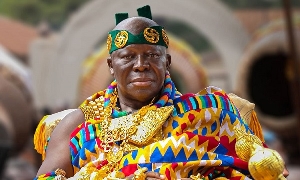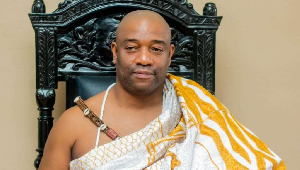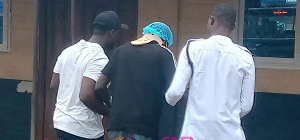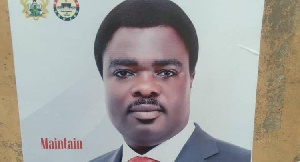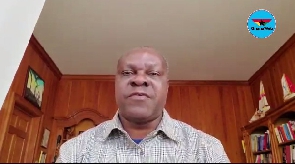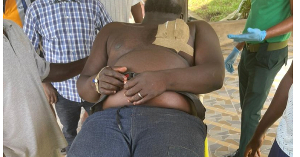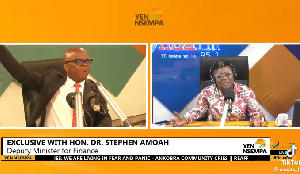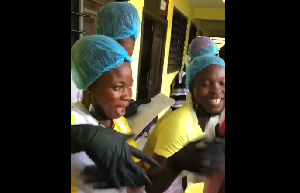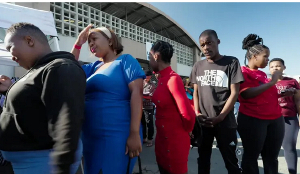 South Africa's unemployment rate has remained stubbornly high
South Africa's unemployment rate has remained stubbornly high
Hundreds of South Africans have turned up at the job fair, CVs and school certificates in hand, hoping that they may get their big break.
Queues are long. Many appear anxious.
Forget the high politics and low skulduggery playing out between the country’s leaders ahead of the 29 May general election, the government-organised job fair in Durban's Umlazi township is where one of the main issues on the minds of ordinary people is on display.
South Africa is facing crushingly high unemployment levels, with the latest jobless figures ticking up slightly to 33% - ranked by the World Bank as the worst of any nation. Among young people, it is even higher at 46%.
This may also explain why not everyone has much enthusiasm for the election.
Aged 37, Mondli Magwaza, says she has never been employed and is looking for any job “because I’m desperate”.
She is among those who have decided they will not vote for the governing African National Congress this time.
Zara, 44, just got retrenched. She has no kind words for the ANC, a party she has always voted for after it led the campaign against white-minority rule.
“Empty, empty promises. I feel very bad.”
The ANC is facing its stiffest test since winning the country's first democratic elections in 1994, as opinion polls indicate that its share of the vote may fall below 50% for the first time.
The state of the economy is certainly one thing that has got people considering political alternatives.
But in their everyday lives, young South Africans are doing what they can to get themselves in the right position to get a job.
Dressed in a fuchsia protective overall, 23-year-old Britney Finnis is carefully unscrewing an electrical socket at the St Charles Lwanga Skills Centre at Orange Farm, on the outskirts of Johannesburg.
She is learning to be an electrician – just one of the many trade subjects on offer.
“It’s difficult finding a job and having these courses really helps a lot,” she says.
Ms Finnis plans to take it further and try and open her own business as “that’s the only way we’re going to get employment”.
She says electricians are hard to find in her community and that was what motivated her to enrol.
“They are rare, and when we do get someone, they usually are very expensive.”
In the sewing room, budding seamstress Rita Mida is stitching a black blazer on an electric machine.
The 34-year-old says she has been a housewife and has ruled out ever finding a job in the formal sector and wants to start her own business.
“I think it’s going to be a bit of a challenge finding resources,” she says but she will give it a go anyway.
“I am going to stay hopeful.”
The Catholic Institute of Education of South Africa runs this centre and 25 others like it across the country.
Nathan Johnstone oversees the national programme and says that about 30% of those who complete the courses are in a job within a year. That may not sound high, but given the economic context it is seen as a success.
The government has a host of initiatives to get people into work but Employment Minister Thulas Nxesi cites “historical structural issues, which are linked to education and skills development” as one of the underlying causes of chronic unemployment.
The years of the racist system of apartheid skewed the economy. It not only embedded huge wealth disparities but also inequalities in education and skills training.
The apartheid and, before that the colonial, economy relied on the country’s vast mineral resources to generate wealth. But South Africa can no longer rely on the mining industries.
“Scars will take a long time to heal,” said President Cyril Ramaphosa as the country marked 30 years of democracy last month. There has been a “generational handing-over of inequality”, he added.
Nevertheless, over the past three decades the ANC has been responsible for a whole generation of South Africans who have gone through the post-apartheid education system and emerged to join the workforce.
“There needs to be a serious alignment of what is going on in the academia, in the universities and mid-level colleges with the labour market,” admits Mr Nxesi.
A 2019 World Bank report identified insufficient skills as a key constraint holding back South Africa’s economic transition in the wake of apartheid.
“There is an absence of work-readiness,” says Adrian Saville, economics professor at the Gordon Institute of Business Science.
“A lot of people that are coming out of the education system and into the workforce simply don’t have the skills and also [lack] the acumen and the readiness to go into the workplace.”
Like the one in Durban, the government has been running jobs fairs across the country for four years now.
“We train them then pass them to the private sector to absorb them,” Minister Nxesi says.
But asked if the private sector had the capacity to absorb the kind of numbers of unemployed people South Africa has, he conceded that “to increase employment you need economic growth, and to have economic growth, you need investment”.
This is really the crux of the matter.
Prof Saville argues that the absence of investment to drive economic growth is the biggest structural gap. The economic growth that has happened, he says, has come from government and consumer spending, “which are not productive sectors and do not create jobs”.
Persistent power problems have also seriously disrupted economic activity and increased operating costs for businesses.
And the Covid-19 pandemic only exacerbated the situation.
South Africa was one of the hardest-hit on the continent. Extended periods of total lockdown drove the economy to the doldrums. “We lost two million jobs,” says the employment minister.
The ANC’s main political rival, the Democratic Alliance (DA), has described recent unemployment figures as a “jobs bloodbath.” The party promises to “transform South Africa into an enterprise economy”. It calls the DA-led Western Cape, the province with the lowest unemployment rate in the country, “South Africa’s job engine” and says it is an example how the party could transform the country.
In contrast, the Economic Freedom Fighters (EFF), led by firebrand Julius Malema, touts nationalisation as the answer to unemployment. The EFF also promises to give a monthly stipend to unemployed graduates.
There is a clear understanding and acknowledgement of the magnitude of the challenge of unemployment across the political divide.
The ANC has evidently scored poorly on jobs, but the alternatives remain untested and their ideas, varied as they may be, remain a hard sell.
At the job fair in Durban there are some who will stick with the ANC as they have not seen any better options, but the sense of disappointment among many is palpable.
One woman, who did not want to be identified, says the “government has failed us. It’s very painful”.

